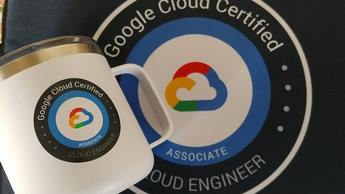Use VCE Exam Simulator to open VCE files

100% Latest & Updated Google Associate Data Practitioner Practice Test Questions, Exam Dumps & Verified Answers!
30 Days Free Updates, Instant Download!
Associate Data Practitioner Premium File

Google Associate Data Practitioner Practice Test Questions, Google Associate Data Practitioner Exam Dumps
With Examsnap's complete exam preparation package covering the Google Associate Data Practitioner Test Questions and answers, study guide, and video training course are included in the premium bundle. Google Associate Data Practitioner Exam Dumps and Practice Test Questions come in the VCE format to provide you with an exam testing environment and boosts your confidence Read More.
The digital world is increasingly powered by data, and organizations across industries are leveraging cloud technologies to store, manage, and analyze vast amounts of information. As data becomes central to decision-making, understanding how cloud systems handle data has become essential for professionals in business, analytics, and emerging data roles. The Google Cloud Associate Data Practitioner certification offers an entry point for individuals looking to develop foundational knowledge of cloud data concepts and services. This certification is designed for people from non-technical backgrounds, making it a practical starting point for business analysts, early-career data specialists, and anyone interested in exploring cloud data workflows.
The certification serves as a bridge between understanding data at a conceptual level and applying practical cloud-based tools. It focuses on building the skills necessary to participate in data-driven projects, collaborate with technical teams, and contribute to business decisions supported by cloud data. By gaining a solid understanding of structured and unstructured data, storage solutions, and core cloud services, candidates can confidently engage with cloud data environments and lay the groundwork for more advanced certifications in data engineering, business intelligence, or machine learning.
Modern organizations rely heavily on data to drive strategic decisions, optimize operations, and deliver better customer experiences. Cloud computing has transformed the way data is handled by providing scalable storage, powerful analytics capabilities, and integration with multiple business applications. Unlike traditional on-premises data systems, cloud platforms offer flexibility, accessibility, and cost efficiency, allowing organizations to store large volumes of structured and unstructured data, perform real-time analysis, and share insights across departments.
Understanding the role of cloud data is critical for professionals who interact with data on a regular basis. Whether working in finance, marketing, operations, or analytics, having a foundational understanding of how cloud data is stored, accessed, and analyzed enables better collaboration with technical teams and more informed decision-making. The Associate Data Practitioner certification emphasizes this understanding, helping learners grasp the flow of data in cloud environments and how it supports business goals.
Before diving into specific tools and services, it is important to understand the core data concepts that underpin cloud computing. Data in the cloud can generally be categorized as structured or unstructured. Structured data refers to information that is organized into rows and columns, such as sales transactions, customer records, or inventory data. This type of data is highly organized and easily queried using standard tools like SQL. Unstructured data, on the other hand, includes text documents, images, videos, social media posts, and other information that does not fit neatly into tables. Unstructured data requires specialized tools for storage, processing, and analysis.
In addition to understanding the types of data, it is essential to be familiar with how data is stored in the cloud. Cloud storage solutions offer scalable, secure, and cost-effective ways to manage both structured and unstructured data. Professionals must understand concepts such as buckets, objects, datasets, and tables, as well as how data is organized for efficient retrieval and analysis. Knowledge of these concepts allows users to navigate cloud platforms effectively, prepare data for analysis, and support governance and compliance requirements.
A cloud data ecosystem involves a variety of roles, each with specific responsibilities. Understanding these roles helps professionals identify how they can contribute to data projects and collaborate with others effectively. Key roles include data analysts, who explore and interpret data to generate insights; data engineers, who design and maintain pipelines to process and store data; and business stakeholders, who use insights to make strategic decisions. Cloud data practitioners must understand where their role fits within this ecosystem and how to interact with other team members to achieve organizational objectives.
The Associate Data Practitioner certification emphasizes cross-functional collaboration and the importance of communication between technical and non-technical teams. By understanding the responsibilities of different roles, professionals can participate meaningfully in data projects, help translate business requirements into technical specifications, and ensure that data initiatives align with organizational goals.
The Associate Data Practitioner certification is specifically designed to help learners gain foundational cloud data knowledge. It focuses on understanding the core concepts and workflows of Google Cloud’s data services rather than in-depth engineering skills. This makes it accessible to business analysts, marketers, sales professionals, and newcomers to cloud computing who want to expand their data literacy.
The certification covers several key areas. First, it introduces the main data roles and responsibilities within the cloud ecosystem, helping learners understand how data teams operate. Second, it explores structured and unstructured data, their use cases, and how they are stored and managed in Google Cloud. Third, it provides a practical overview of core cloud tools such as BigQuery, Cloud Storage, and Dataprep, which are used for querying, storing, and preparing data for analysis. Additionally, the certification emphasizes data governance, quality, and compliance, ensuring that learners understand how to maintain the integrity and security of organizational data.
Developing foundational knowledge in cloud data provides multiple advantages. First, it enables professionals to participate in data-driven decision-making more effectively. By understanding how data flows through cloud systems and how it can be analyzed, individuals can contribute insights that drive business strategy. Second, familiarity with cloud data tools and concepts enhances collaboration with technical teams. When business and technical stakeholders speak the same language, projects move faster and achieve better outcomes.
Furthermore, cloud data literacy lays the groundwork for future career growth. Professionals who begin with foundational skills can progress into more specialized roles such as data engineering, business intelligence, or machine learning. Even for those who remain in non-technical roles, understanding cloud data concepts is increasingly valuable, as data-driven decision-making becomes integral to nearly every industry.
A core aspect of the certification is understanding the difference between structured and unstructured data and how each is used in practice. Structured data is often used in operational reporting, dashboards, and metrics tracking. For example, a sales team might analyze transaction records stored in a structured database to monitor revenue trends. Unstructured data, however, often contains rich insights that require different processing techniques. Social media sentiment analysis, image recognition, and document parsing are all examples of unstructured data applications. Learning how to work with both types of data ensures that professionals can leverage the full spectrum of organizational information.
Understanding the differences between these data types also informs decisions about storage and analysis tools. Cloud services like BigQuery are optimized for structured data queries, while Cloud Storage and Dataprep can handle unstructured data efficiently. Professionals who can navigate these distinctions are better equipped to support their teams and contribute to strategic initiatives.
The Associate Data Practitioner certification introduces learners to essential Google Cloud tools. BigQuery, a serverless data warehouse, allows users to perform fast SQL queries on large datasets without managing infrastructure. Cloud Storage provides scalable, durable storage for both structured and unstructured data. Dataprep offers a user-friendly interface for cleaning and transforming data before analysis. Understanding these tools and their applications is crucial for anyone seeking to work effectively in cloud data environments.
These tools enable professionals to perform tasks such as analyzing customer behavior, preparing datasets for reporting, and generating insights to support decision-making. By gaining hands-on experience with these services, learners develop practical skills that translate directly to workplace scenarios.
Maintaining the integrity, security, and compliance of data is a critical responsibility for anyone working in cloud environments. The certification emphasizes fundamental concepts of governance, quality, and compliance, ensuring that professionals understand best practices for managing sensitive information. This includes understanding access controls, data lifecycle management, and regulatory requirements. Awareness of these concepts helps prevent data breaches, ensures accurate reporting, and supports ethical use of data.
Effective cloud data management requires collaboration between business and technical teams. The certification highlights the importance of working together to ensure data initiatives are successful. Professionals learn how to communicate findings, share insights, and align data projects with organizational objectives. Strong collaboration skills enhance the impact of data-driven initiatives and support a culture of informed decision-making.
Even without a technical background, professionals who complete the Associate Data Practitioner certification can contribute meaningfully to data projects. Business analysts can generate insights from reports and dashboards, marketing teams can leverage data to optimize campaigns, and sales teams can track performance metrics. Students and newcomers to cloud computing gain a foundational understanding that prepares them for further learning, while experienced professionals expand their cross-functional data literacy.
By developing a foundational understanding of cloud data concepts, tools, and workflows, learners are better prepared to navigate modern data environments. This knowledge serves as a stepping stone toward more advanced certifications and opens opportunities for career growth in analytics, engineering, and business intelligence.
Working effectively with data in the cloud requires a solid understanding of the tools and services that facilitate storage, processing, and analysis. Google Cloud provides a variety of services tailored to handle structured and unstructured data, perform complex queries, and generate meaningful insights. The Associate Data Practitioner certification introduces learners to these tools, emphasizing practical usage and foundational knowledge rather than deep technical expertise. This approach ensures that business professionals, analysts, and newcomers to cloud computing can confidently engage with cloud data environments.
Understanding these tools allows professionals to participate actively in data-driven projects, collaborate with technical teams, and support decision-making processes. In this section, we explore the primary Google Cloud services relevant to the certification, including BigQuery, Cloud Storage, Dataprep, and Looker Studio, along with best practices for working with structured and unstructured data.
BigQuery is a serverless, highly scalable, and cost-effective data warehouse that enables fast SQL queries on large datasets. Unlike traditional databases, BigQuery eliminates the need to manage infrastructure, allowing users to focus on analyzing data rather than maintaining servers. This makes it particularly suitable for business professionals and analysts who need to generate insights quickly without extensive technical setup.
BigQuery supports both structured and semi-structured data, providing flexibility in handling different types of information. Structured data, stored in tables with rows and columns, can be queried using familiar SQL commands. Semi-structured data, such as JSON files, can also be ingested and queried efficiently, making BigQuery a versatile tool for modern data workflows.
Some of the core features that make BigQuery a central tool for data practitioners include:
Scalability: BigQuery can handle terabytes to petabytes of data without requiring manual scaling or server management.
Performance: Optimized query execution ensures fast analysis even on massive datasets.
Integration: BigQuery integrates seamlessly with other Google Cloud services, such as Cloud Storage, Dataprep, and Looker Studio, allowing end-to-end data workflows.
Cost efficiency: Pay-per-query pricing and on-demand resource usage make it affordable for organizations of all sizes.
Understanding how to load, query, and interpret data in BigQuery is a key learning objective of the certification. Learners are encouraged to practice writing SQL queries, exploring datasets, and generating reports to gain confidence in real-world scenarios.
Cloud Storage is a scalable and secure service designed to store both structured and unstructured data. It serves as a foundation for many data workflows, providing a central location to manage datasets before they are analyzed in tools like BigQuery or Dataprep. Cloud Storage supports various file formats, including CSV, JSON, Avro, and Parquet, allowing flexibility in handling diverse data sources.
Proper organization is crucial for managing data efficiently. Cloud Storage uses a hierarchical structure consisting of buckets and objects. Buckets act as containers for storing objects, which can be files or datasets. Best practices for organization include:
Naming conventions that reflect the type and purpose of the data
Separating raw and processed data into different buckets
Applying access controls to ensure security and compliance
Professionals working with cloud data must understand how to structure buckets and objects, set permissions, and manage lifecycle policies to optimize storage costs and maintain data integrity.
Cloud Storage is widely used across industries for tasks such as:
Archiving historical data for future analysis
Storing large unstructured datasets, including images, videos, and logs
Serving as a staging area for data before ingestion into BigQuery
Enabling data sharing between teams and external partners
By mastering Cloud Storage, learners gain the ability to manage data effectively, ensuring that it is accessible, secure, and ready for analysis.
Dataprep is a user-friendly tool for cleaning, transforming, and preparing data for analysis. It provides a visual interface that allows users to explore datasets, identify anomalies, and apply transformations without writing code. This makes Dataprep particularly suitable for business professionals and analysts who need to work with data but do not have extensive programming experience.
Dataprep helps users:
Clean data by removing duplicates, correcting errors, and handling missing values
Transform data into consistent formats suitable for analysis
Join datasets from different sources to create comprehensive reports
Automate repetitive data preparation tasks to save time
By using Dataprep in conjunction with BigQuery and Cloud Storage, learners can develop complete end-to-end workflows, from data ingestion to analysis and visualization.
Dataprep is used in a variety of scenarios, including:
Preparing sales and marketing datasets for trend analysis
Standardizing customer information from multiple sources
Transforming survey or operational data into formats suitable for dashboards
Ensuring data quality before reporting or visualization
Familiarity with Dataprep equips professionals with the skills to handle real-world data preparation challenges, an essential aspect of cloud data workflows.
Looker Studio is a cloud-based platform for creating interactive dashboards and reports. It allows users to visualize data from multiple sources, including BigQuery and Cloud Storage, in a way that supports decision-making and storytelling. Looker Studio enables teams to explore metrics, track performance, and share insights across the organization.
Looker Studio provides:
Drag-and-drop functionality for building charts, tables, and graphs
Integration with multiple data sources for comprehensive reporting
Real-time updates to dashboards for timely insights
Customizable templates and visualization options to match organizational needs
For Associate Data Practitioner learners, Looker Studio offers an accessible way to translate data into actionable insights, bridging the gap between technical analysis and business decision-making.
SQL, or Structured Query Language, is a fundamental tool for interacting with structured data in cloud environments. Learning basic SQL commands is an essential component of the certification, as it enables professionals to extract, filter, and aggregate data from BigQuery datasets.
Essential SQL skills for data practitioners include:
Selecting specific columns and rows from tables
Filtering data using conditions
Aggregating data with functions such as sum, average, and count
Joining tables to combine related information
Sorting and grouping data to identify trends and patterns
Mastering these skills allows learners to perform independent analyses, create meaningful reports, and support business decisions with data-driven insights.
Modern data workflows often involve both structured and unstructured data. Cloud practitioners must understand how to integrate these data types for comprehensive analysis. Structured data, such as customer transactions or financial records, can be easily queried and visualized. Unstructured data, including text, images, and social media content, requires preprocessing using tools like Dataprep or machine learning models.
By combining both types of data, professionals can uncover deeper insights. For example, analyzing customer reviews alongside sales data can provide context for purchasing trends, while monitoring social media sentiment can enhance marketing strategies. Learning how to manage and integrate these data types is a critical skill for cloud data practitioners.
Effective cloud data workflows require more than just knowledge of individual tools. Professionals must understand how to design processes that are efficient, secure, and compliant. Best practices include:
Establishing clear data governance policies
Regularly monitoring data quality and completeness
Implementing access controls and permissions to protect sensitive information
Automating repetitive tasks to improve efficiency
Documenting workflows to ensure clarity and repeatability
Adhering to these practices ensures that cloud data initiatives are successful, scalable, and aligned with organizational objectives.
The skills gained through understanding Google Cloud tools are applicable across many roles. Business analysts can use BigQuery and Looker Studio to generate actionable insights, while marketing teams can analyze campaign performance using structured and unstructured datasets. Operations teams can track process efficiency, and finance teams can monitor budget and revenue trends.
Hands-on practice with BigQuery, Cloud Storage, Dataprep, and Looker Studio allows learners to apply knowledge in realistic scenarios, reinforcing concepts learned in the certification path. By developing these skills, professionals enhance their ability to contribute to data projects, support decision-making, and collaborate effectively with technical teams.
Understanding Google Cloud tools prepares learners to address real-world data challenges. These include handling large volumes of data, ensuring data quality, integrating disparate datasets, and generating meaningful insights for stakeholders. Familiarity with cloud services, combined with foundational knowledge of structured and unstructured data, enables professionals to navigate complex data environments and deliver value to their organizations.
The Google Cloud Associate Data Practitioner certification provides a foundation for understanding data in cloud environments, making it an excellent starting point for professionals entering data-related roles. Proper preparation for the exam involves a combination of learning core concepts, gaining hands-on experience, and understanding how cloud tools and workflows are applied in practical scenarios. This section explores the best strategies, resources, and practices for successfully preparing for the certification.
Preparation is not solely about memorizing facts; it is about developing an understanding of cloud data processes, becoming comfortable with the tools, and building confidence in applying knowledge to real-world problems. The exam evaluates familiarity with cloud data services, structured and unstructured data, governance practices, and collaboration within data teams, making comprehensive preparation essential.
Before beginning study efforts, it is critical to understand the objectives of the exam. The Associate Data Practitioner certification focuses on foundational knowledge rather than deep technical skills. Candidates are expected to demonstrate comprehension of:
Cloud data roles and responsibilities, including how different teams interact
Differences between structured and unstructured data and their use cases
Core Google Cloud services such as BigQuery, Cloud Storage, and Dataprep
Basic SQL queries for data analysis
Data governance, quality, and compliance practices
Effective collaboration between business and data teams
Reviewing the official exam guide ensures that learners focus on the areas most relevant to the assessment and helps identify any gaps in knowledge that need to be addressed during preparation.
Cloud Skills Boost provides a structured learning path for the Associate Data Practitioner certification. This resource includes guided modules, hands-on labs, and interactive exercises that allow learners to practice using cloud tools in realistic scenarios. Following this learning path offers several benefits:
Step-by-step guidance: Modules introduce concepts incrementally, building understanding over time
Hands-on practice: Labs provide opportunities to interact with BigQuery, Cloud Storage, Dataprep, and Looker Studio
Practical application: Exercises simulate real-world tasks, such as querying datasets and preparing data for analysis
Progress tracking: Learners can monitor their advancement and identify areas needing improvement
Completing the learning path equips candidates with the confidence and experience necessary to navigate the exam effectively.
Structured Query Language is a fundamental skill for cloud data practitioners, as it enables interaction with structured datasets. While the exam does not require advanced SQL expertise, understanding basic querying and data manipulation is essential. Key areas to focus on include:
Selecting specific columns and rows from a table
Filtering records using conditions and operators
Aggregating data using functions such as sum, average, and count
Grouping and sorting results to identify trends
Joining multiple tables to consolidate related information
Practicing SQL queries using sample datasets in BigQuery helps learners become comfortable with the syntax, understand how to extract insights, and apply these skills in business scenarios.
Hands-on experience with core Google Cloud tools is critical for exam preparation. Working directly with BigQuery, Cloud Storage, Dataprep, and Looker Studio helps learners understand how data flows through cloud systems and how each service contributes to analysis.
In BigQuery, learners should practice:
Loading structured datasets and running queries
Filtering and aggregating data to generate insights
Understanding table schemas and dataset organization
Exporting query results for further analysis or visualization
Exploring these functions in a live environment reinforces theoretical knowledge and prepares candidates for questions related to practical applications.
For Cloud Storage, hands-on exercises may include:
Creating and organizing buckets for structured and unstructured data
Uploading files in various formats such as CSV, JSON, and Parquet
Applying permissions and access controls to ensure data security
Using lifecycle management features to optimize storage
By working with Cloud Storage, learners gain familiarity with data organization, access management, and preparation for downstream analysis.
In Dataprep, learners should focus on:
Importing datasets from Cloud Storage
Cleaning and transforming data using visual tools
Applying formulas and transformations to standardize information
Joining datasets to create comprehensive views for reporting
Dataprep exercises teach practical skills for preparing data efficiently, a crucial component of the exam and real-world workflows.
Looker Studio exercises help learners:
Connect dashboards to BigQuery datasets
Visualize data through charts, tables, and graphs
Create filters and dynamic views for interactive reporting
Share dashboards with stakeholders for collaboration
Using Looker Studio to visualize results reinforces the connection between data analysis and business decision-making, an important aspect of the certification.
Data governance, quality, and compliance are central to cloud data management. The exam tests candidates on their awareness of these practices, including:
Ensuring data accuracy and completeness
Implementing access controls and role-based permissions
Managing data lifecycle, retention, and deletion policies
Adhering to regulatory requirements and organizational standards
Understanding these principles enables learners to support secure and reliable data workflows, which is essential for both the exam and workplace scenarios.
Effective preparation requires structured study planning. Candidates should allocate time for:
Reviewing the exam guide and understanding objectives
Completing Cloud Skills Boost modules and labs
Practicing SQL queries and exploring datasets in BigQuery
Preparing data using Dataprep and visualizing insights in Looker Studio
Revisiting challenging concepts and repeating hands-on exercises
Setting aside dedicated study periods and maintaining a consistent schedule increases retention and confidence. Using practice labs and sample exercises also allows learners to identify areas needing additional attention.
Engaging with peers, mentors, or online study groups can enhance exam preparation. Collaboration allows learners to:
Discuss complex concepts and clarify doubts
Share tips and techniques for using Google Cloud tools
Practice real-world scenarios collaboratively
Gain insights from others’ experiences and perspectives
Participating in community discussions or study groups can provide motivation and deepen understanding, helping learners feel more confident when approaching the exam.
Using practice exams and knowledge checks is an effective way to simulate the testing environment. These tools help learners:
Familiarize themselves with exam format and question types
Assess readiness by identifying strengths and weaknesses
Build confidence in answering scenario-based questions
Improve time management during the actual exam
Taking multiple practice assessments allows learners to refine their approach, focus on weak areas, and track improvement over time.
Preparation for the exam should also include applying knowledge to realistic business scenarios. This approach reinforces learning by connecting theoretical concepts with practical applications. Examples of real-world exercises include:
Analyzing sales data in BigQuery to identify trends and patterns
Using Dataprep to clean and transform marketing campaign datasets
Visualizing performance metrics in Looker Studio for management reporting
Managing storage and access for sensitive data in Cloud Storage
By practicing these scenarios, learners develop the ability to handle tasks they are likely to encounter in a professional setting, which also strengthens exam performance.
Regular review of foundational concepts ensures retention and mastery. Candidates should revisit topics such as:
Data types, including structured and unstructured data
Roles and responsibilities in cloud data ecosystems
Core Google Cloud services and their functions
SQL query techniques and best practices
Data governance, quality, and compliance considerations
Using flashcards, notes, or summaries can aid in quick reviews and reinforce understanding before the exam.
Continuous self-assessment is important during exam preparation. Learners should track progress through:
Completed learning modules and labs
Accuracy in practice exercises and queries
Understanding of governance and compliance principles
Confidence in using cloud tools for data analysis and visualization
Adjusting study strategies based on performance helps focus efforts on areas that need improvement, ensuring efficient and comprehensive preparation.
Confidence is a key factor in performing well on the Associate Data Practitioner exam. By combining hands-on practice, review of core concepts, and exposure to realistic scenarios, learners can build self-assurance in their abilities. Regular practice with cloud tools, consistent study routines, and peer discussions all contribute to a stronger sense of readiness.
Developing confidence also involves recognizing the scope of the certification. The exam focuses on foundational knowledge, practical applications, and understanding workflows rather than advanced technical implementations. Understanding this scope helps reduce anxiety and encourages a focused approach to preparation.
Successful exam preparation requires integrating knowledge across multiple tools and concepts. Learners should practice connecting BigQuery queries with Cloud Storage datasets, transforming data using Dataprep, and visualizing results in Looker Studio. This holistic approach mirrors real-world workflows and ensures that candidates can understand the full data lifecycle from ingestion to insight.
Integration exercises help learners see how cloud tools complement each other, reinforce practical knowledge, and prepare for scenario-based exam questions. The ability to navigate the end-to-end data process is a distinguishing factor for candidates seeking to excel in the certification.
The Google Cloud Associate Data Practitioner certification opens a wide range of opportunities for professionals seeking to build a career in cloud data. Beyond exam preparation, the knowledge and skills gained through this certification have practical applications that extend to analytics, engineering, business intelligence, and cross-functional business roles. Understanding how to apply cloud data concepts in real-world scenarios is essential for maximizing the value of the certification and advancing in a data-driven career.
We explored the various career pathways, the roles that benefit from the certification, and how the skills acquired can be applied in practical business and technical contexts. It also highlights the importance of collaboration, continuous learning, and adaptation to evolving cloud technologies.
Completing the Associate Data Practitioner certification positions professionals for a variety of roles that involve interacting with data in cloud environments. These include:
Business analysts who translate data into actionable insights
Marketing or sales professionals analyzing customer behavior and campaign performance
Operations specialists monitoring process efficiency and resource utilization
Students or entry-level professionals exploring careers in cloud computing or data analytics
The certification provides foundational knowledge, making it suitable for those at the beginning of their data journey, as well as experienced professionals seeking to expand their understanding of cloud data workflows.
While the Associate Data Practitioner certification focuses on foundational skills, it also serves as a stepping stone toward more advanced roles and certifications. Professionals who wish to progress can pursue:
Data Engineer roles, focusing on building and maintaining data pipelines and infrastructure
Business Intelligence Analysts, specializing in dashboards, reporting, and decision support
Machine Learning Engineers, using structured and unstructured data to develop predictive models
Cloud Architects, designing comprehensive cloud data solutions for organizations
By establishing a strong foundation with this certification, learners are better prepared to pursue specialized paths that require deeper technical expertise and experience.
Certified professionals can leverage their skills to support business analytics initiatives. Business analysts, for instance, can use BigQuery to query datasets, Dataprep to clean and prepare data, and Looker Studio to visualize trends. These activities enable teams to make data-driven decisions that improve marketing strategies, optimize operations, or increase customer engagement.
Practical applications include:
Analyzing sales performance to identify top-performing products or regions
Monitoring website or app analytics to understand user behavior
Tracking marketing campaign effectiveness and customer acquisition costs
Generating operational dashboards to monitor efficiency and resource utilization
Through these applications, professionals can demonstrate their ability to bridge the gap between raw data and actionable insights, a key advantage in modern data environments.
Understanding the difference between structured and unstructured data allows certified professionals to handle a wider variety of datasets. Structured data, such as financial records or inventory logs, can be efficiently analyzed using SQL queries in BigQuery. Unstructured data, including text files, images, or social media content, requires additional preparation and transformation using tools like Dataprep before analysis.
Combining both types of data provides richer insights. For example, integrating customer transaction records with social media sentiment can reveal correlations between purchasing patterns and customer perception. Professionals who can navigate both structured and unstructured data are highly valued for their ability to derive comprehensive business insights.
One of the most significant benefits of the Associate Data Practitioner certification is the ability to collaborate effectively across business and technical teams. Professionals with foundational cloud data knowledge can communicate clearly with data engineers, analysts, and business stakeholders, ensuring that projects align with organizational objectives.
Collaboration involves:
Sharing insights and dashboards to inform decision-making
Translating business requirements into data workflows or queries
Ensuring data quality and compliance throughout the project lifecycle
Supporting cross-functional initiatives by providing accessible, actionable data
By fostering collaboration, certified professionals contribute to the success of data-driven projects and help create a culture of informed decision-making within their organizations.
Hands-on experience with Google Cloud tools enables certified professionals to apply their knowledge to practical projects. Examples of real-world applications include:
Using BigQuery to analyze large datasets for sales forecasting or trend identification
Storing and managing diverse datasets in Cloud Storage for easy access and integration
Cleaning and transforming customer or operational data in Dataprep to prepare it for analysis
Visualizing performance metrics in Looker Studio to support executive reporting
By working with these tools, professionals can execute end-to-end cloud data workflows, from ingestion to analysis and visualization, mirroring the processes used in actual business environments.
Certified professionals play a crucial role in supporting data-driven decision-making. With a foundational understanding of cloud data services, they can:
Provide insights that guide strategic business choices
Identify trends, anomalies, and opportunities from diverse datasets
Recommend data-driven actions for marketing, operations, finance, or customer engagement
Monitor key performance indicators and track progress against organizational goals
Being able to contribute to decision-making processes enhances the value of professionals within their teams and organizations, positioning them as reliable partners in data initiatives.
The certification lays the groundwork for further professional development. By mastering foundational concepts, tools, and workflows, learners are better prepared to pursue more advanced certifications and specialized roles. Continued learning may include:
Deepening knowledge of BigQuery optimization and advanced SQL
Exploring machine learning applications on structured and unstructured datasets
Developing advanced visualization and reporting skills in Looker Studio
Gaining expertise in cloud architecture, data engineering, or AI integration
Establishing a strong base ensures that professionals can progress confidently in the cloud data ecosystem and take on more complex responsibilities over time.
The skills gained through the certification translate directly to practical workplace benefits. Examples include:
Marketing teams analyzing campaign data to improve customer targeting
Sales teams tracking performance metrics and pipeline effectiveness
Operations teams monitoring efficiency and identifying areas for improvement
Students or entry-level professionals gaining credibility when entering cloud data roles
These real-world applications illustrate how foundational knowledge of cloud data services and workflows enhances professional effectiveness and supports organizational goals.
Cloud data environments are constantly evolving, with new tools, technologies, and best practices emerging regularly. Certified professionals must remain adaptable, applying their foundational knowledge to learn and implement new solutions.
Skills such as querying datasets, preparing and transforming data, and visualizing insights provide a versatile toolkit that can be applied to emerging trends in cloud computing, data analytics, and machine learning. Being adaptable ensures that professionals remain relevant in a rapidly changing technological landscape, capable of leveraging new tools and approaches to support business objectives.
A key advantage of the certification is the development of cross-functional data literacy. Professionals who understand cloud data workflows, roles, and tools can contribute effectively to projects even if their primary expertise is in business, marketing, or operations. This cross-functional capability enables teams to work more cohesively, reduces miscommunication, and ensures that data initiatives align with organizational strategy.
Cross-functional literacy involves:
Understanding the flow of data from ingestion to analysis
Recognizing the responsibilities of different team members in the data ecosystem
Communicating insights and recommendations clearly to stakeholders
Applying governance and compliance best practices in collaborative projects
Developing these skills strengthens overall team performance and enhances the impact of data-driven initiatives.
The Associate Data Practitioner certification is not just a credential; it is a stepping stone for long-term career growth. Professionals who gain foundational knowledge in cloud data can position themselves for increasingly specialized roles, including data engineering, business intelligence, and machine learning. Additionally, the skills developed during preparation and certification help professionals adapt to organizational needs, support strategic initiatives, and demonstrate value to employers.
Long-term career benefits include:
Increased employability and credibility in data-related roles
Opportunities to take on more complex data projects
Foundation for pursuing advanced cloud certifications
Enhanced ability to contribute to organizational decision-making
The practical applications of the certification extend across various industries. Cloud data skills are valuable in sectors such as finance, healthcare, retail, marketing, and technology. Professionals can apply their knowledge to:
Analyze financial data for risk assessment and forecasting
Monitor patient outcomes and operational efficiency in healthcare
Track inventory, sales, and customer engagement in retail
Optimize marketing campaigns through data-driven insights
Support product development and research initiatives in technology firms
By applying the skills learned, certified professionals become versatile contributors capable of adding value in diverse organizational contexts.
Hands-on experience with Google Cloud tools complements theoretical knowledge and reinforces practical skills. Working directly with BigQuery, Cloud Storage, Dataprep, and Looker Studio allows professionals to simulate real-world tasks, such as querying large datasets, cleaning and transforming data, and creating actionable visualizations. These experiences prepare learners for both the exam and real workplace challenges.
Practicing hands-on workflows helps professionals:
Build confidence in managing structured and unstructured data
Develop the ability to troubleshoot common data issues
Understand how to integrate multiple tools for end-to-end solutions
Translate data insights into actionable business recommendations
The Google Cloud Associate Data Practitioner certification provides a solid foundation for understanding how data is managed, analyzed, and applied in cloud environments. Across this series, we explored key concepts, practical tools, exam preparation strategies, and real-world applications, highlighting how foundational knowledge can empower professionals to contribute effectively to data-driven initiatives.
Starting with an understanding of cloud data roles, structured and unstructured data, and core Google Cloud services, learners develop the ability to navigate modern data ecosystems. The practical use of tools such as BigQuery, Cloud Storage, Dataprep, and Looker Studio reinforces the connection between theory and real-world application, enabling professionals to analyze, visualize, and transform data efficiently.
Exam preparation emphasizes both conceptual understanding and hands-on experience. By practicing SQL queries, working with datasets, exploring cloud tools, and applying governance and compliance principles, candidates gain the confidence and skills needed to succeed. Preparation also encourages critical thinking, problem-solving, and familiarity with realistic business scenarios, ensuring readiness for both the exam and professional applications.
Beyond certification, the skills acquired open doors to diverse career pathways. Business analysts, marketers, operations professionals, and students can leverage cloud data literacy to support decision-making, optimize processes, and drive organizational outcomes. The knowledge gained provides a stepping stone to advanced roles such as data engineer, business intelligence analyst, or machine learning engineer while fostering collaboration across business and technical teams.
In a world where data drives strategy and innovation, foundational cloud data skills are increasingly essential. The Associate Data Practitioner certification equips learners with the tools, concepts, and confidence to navigate cloud environments effectively, contributing meaningfully to projects and positioning themselves for long-term career growth. By combining practical experience with a strong understanding of cloud data principles, certified professionals are well-prepared to thrive in today’s data-driven landscape.
ExamSnap's Google Associate Data Practitioner Practice Test Questions and Exam Dumps, study guide, and video training course are complicated in premium bundle. The Exam Updated are monitored by Industry Leading IT Trainers with over 15 years of experience, Google Associate Data Practitioner Exam Dumps and Practice Test Questions cover all the Exam Objectives to make sure you pass your exam easily.

Google Training Courses














SPECIAL OFFER: GET 10% OFF
This is ONE TIME OFFER

A confirmation link will be sent to this email address to verify your login. *We value your privacy. We will not rent or sell your email address.
Download Free Demo of VCE Exam Simulator
Experience Avanset VCE Exam Simulator for yourself.
Simply submit your e-mail address below to get started with our interactive software demo of your free trial.